ECCDD103A: Child Development: Influencing Factors & Self-Identity
VerifiedAdded on 2022/09/28
|9
|2417
|18
Report
AI Summary
This report explores the significant factors influencing children's development and self-identity, focusing on emotive, social, and psychological aspects in children aged birth to five years. It discusses various theories, including cognitive, behavioral, developmental, social, personality, psychosocial, and biological psychology, to explain how young children and infants develop self-identity. The report also examines how early childhood settings and educators can impact children's emotive, social, and mental well-being, considering environmental, within-child, and family risk factors. The findings highlight the importance of understanding these influences to support a child's healthy development and strong sense of identity, emphasizing the role of caregivers in fostering positive emotive and social growth.
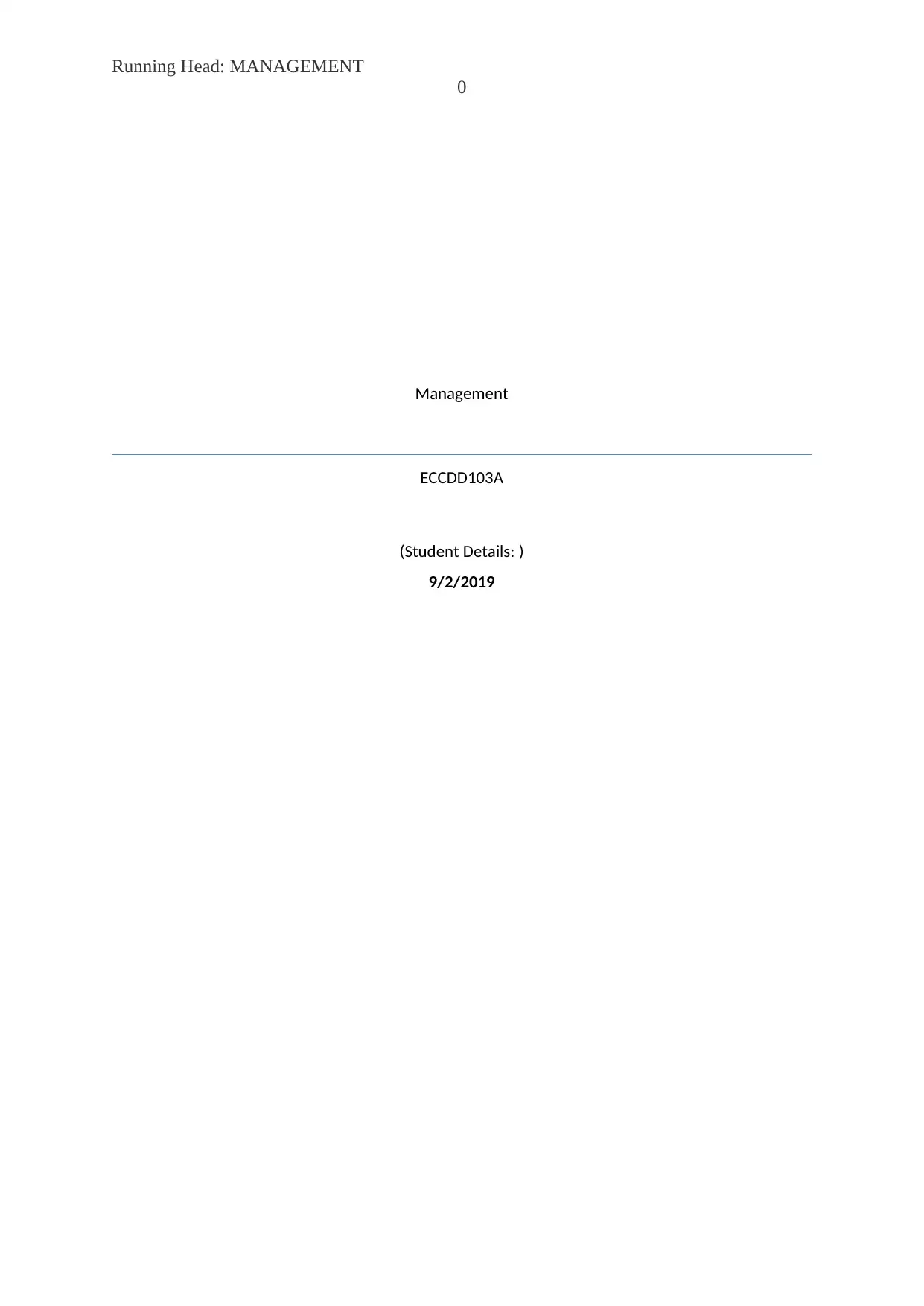
Running Head: MANAGEMENT
0
Management
ECCDD103A
(Student Details: )
9/2/2019
0
Management
ECCDD103A
(Student Details: )
9/2/2019
Paraphrase This Document
Need a fresh take? Get an instant paraphrase of this document with our AI Paraphraser
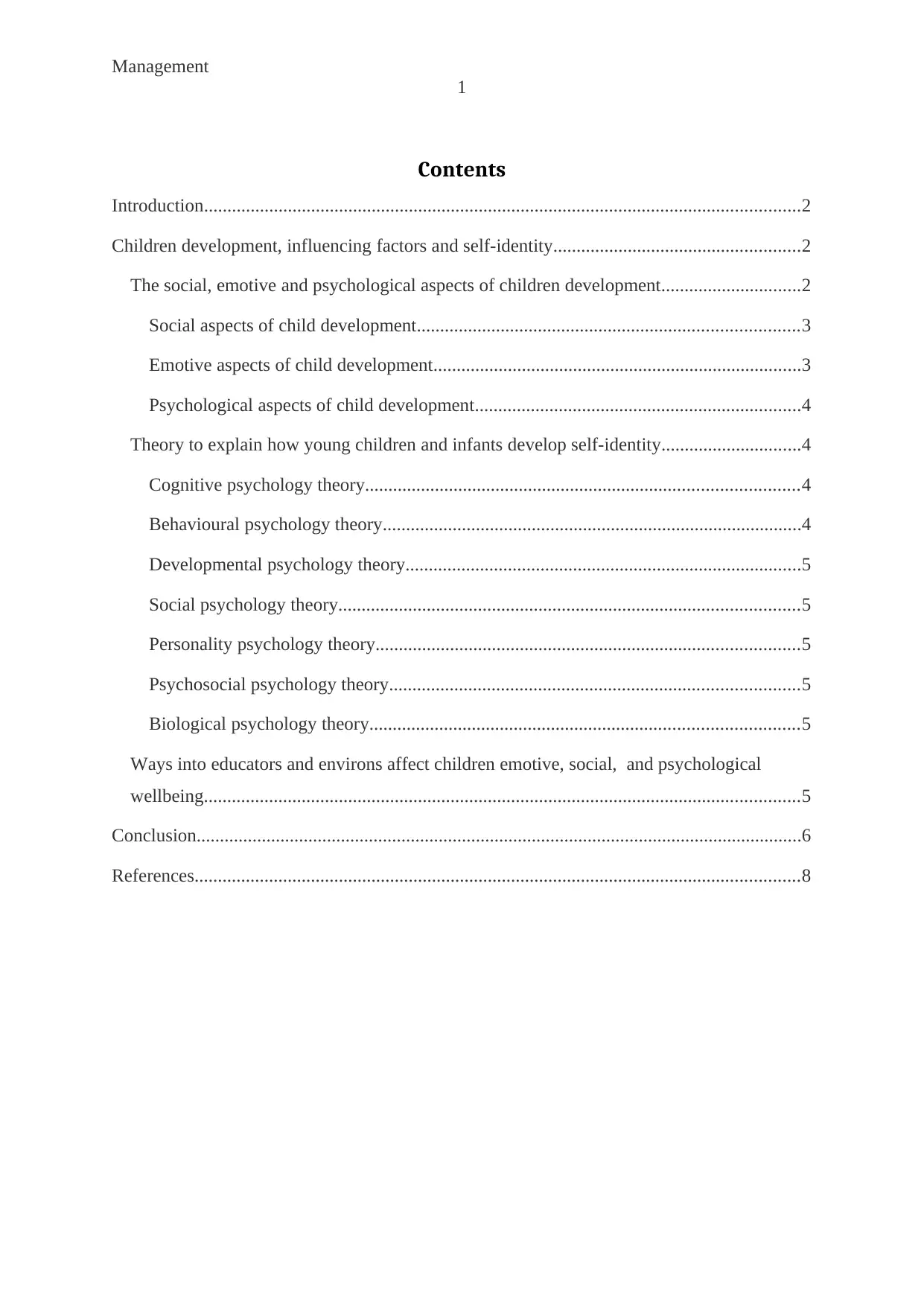
Management
1
Contents
Introduction................................................................................................................................2
Children development, influencing factors and self-identity.....................................................2
The social, emotive and psychological aspects of children development..............................2
Social aspects of child development..................................................................................3
Emotive aspects of child development...............................................................................3
Psychological aspects of child development......................................................................4
Theory to explain how young children and infants develop self-identity..............................4
Cognitive psychology theory.............................................................................................4
Behavioural psychology theory..........................................................................................4
Developmental psychology theory.....................................................................................5
Social psychology theory...................................................................................................5
Personality psychology theory...........................................................................................5
Psychosocial psychology theory........................................................................................5
Biological psychology theory............................................................................................5
Ways into educators and environs affect children emotive, social, and psychological
wellbeing................................................................................................................................5
Conclusion..................................................................................................................................6
References..................................................................................................................................8
1
Contents
Introduction................................................................................................................................2
Children development, influencing factors and self-identity.....................................................2
The social, emotive and psychological aspects of children development..............................2
Social aspects of child development..................................................................................3
Emotive aspects of child development...............................................................................3
Psychological aspects of child development......................................................................4
Theory to explain how young children and infants develop self-identity..............................4
Cognitive psychology theory.............................................................................................4
Behavioural psychology theory..........................................................................................4
Developmental psychology theory.....................................................................................5
Social psychology theory...................................................................................................5
Personality psychology theory...........................................................................................5
Psychosocial psychology theory........................................................................................5
Biological psychology theory............................................................................................5
Ways into educators and environs affect children emotive, social, and psychological
wellbeing................................................................................................................................5
Conclusion..................................................................................................................................6
References..................................................................................................................................8
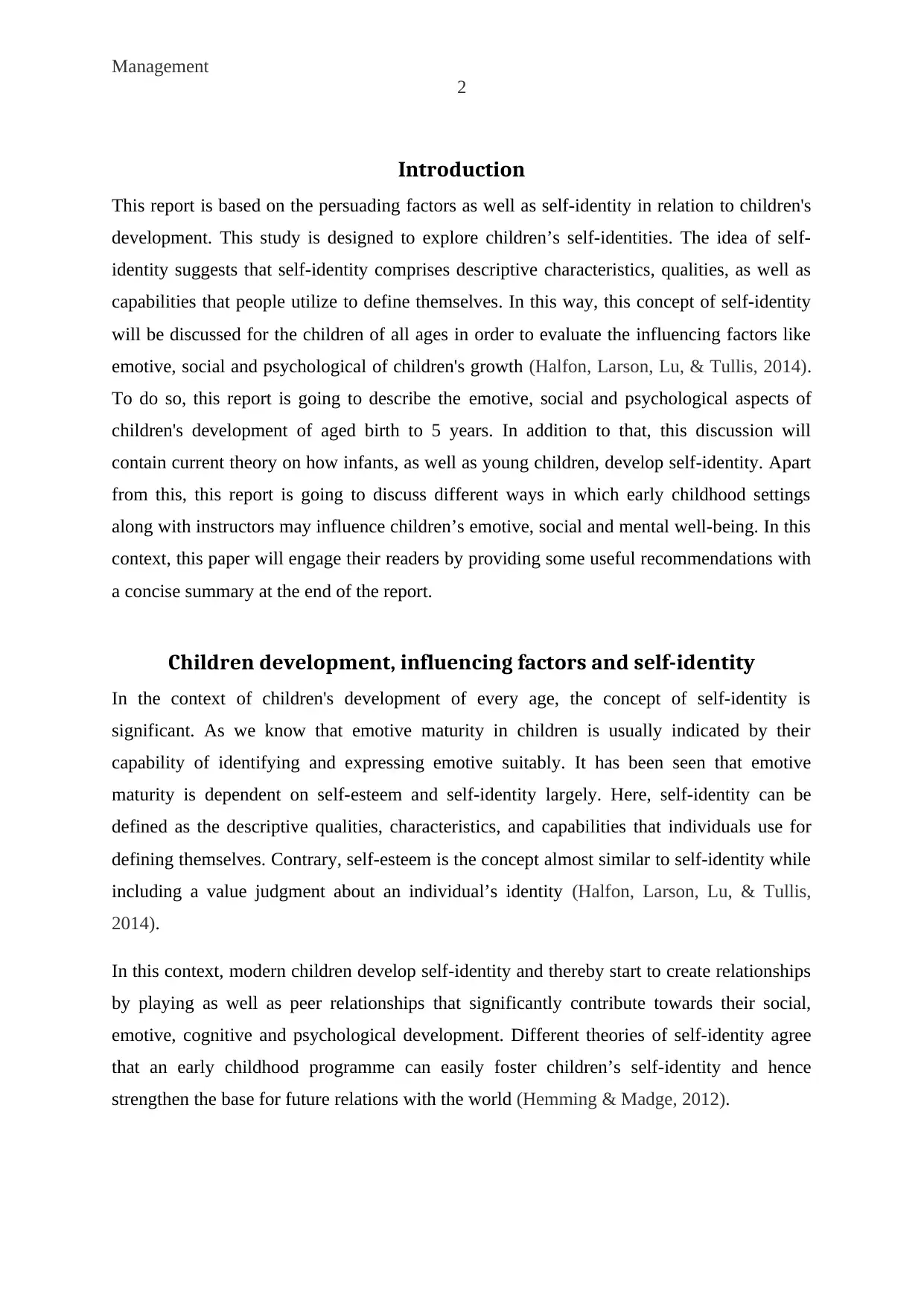
Management
2
Introduction
This report is based on the persuading factors as well as self-identity in relation to children's
development. This study is designed to explore children’s self-identities. The idea of self-
identity suggests that self-identity comprises descriptive characteristics, qualities, as well as
capabilities that people utilize to define themselves. In this way, this concept of self-identity
will be discussed for the children of all ages in order to evaluate the influencing factors like
emotive, social and psychological of children's growth (Halfon, Larson, Lu, & Tullis, 2014).
To do so, this report is going to describe the emotive, social and psychological aspects of
children's development of aged birth to 5 years. In addition to that, this discussion will
contain current theory on how infants, as well as young children, develop self-identity. Apart
from this, this report is going to discuss different ways in which early childhood settings
along with instructors may influence children’s emotive, social and mental well-being. In this
context, this paper will engage their readers by providing some useful recommendations with
a concise summary at the end of the report.
Children development, influencing factors and self-identity
In the context of children's development of every age, the concept of self-identity is
significant. As we know that emotive maturity in children is usually indicated by their
capability of identifying and expressing emotive suitably. It has been seen that emotive
maturity is dependent on self-esteem and self-identity largely. Here, self-identity can be
defined as the descriptive qualities, characteristics, and capabilities that individuals use for
defining themselves. Contrary, self-esteem is the concept almost similar to self-identity while
including a value judgment about an individual’s identity (Halfon, Larson, Lu, & Tullis,
2014).
In this context, modern children develop self-identity and thereby start to create relationships
by playing as well as peer relationships that significantly contribute towards their social,
emotive, cognitive and psychological development. Different theories of self-identity agree
that an early childhood programme can easily foster children’s self-identity and hence
strengthen the base for future relations with the world (Hemming & Madge, 2012).
2
Introduction
This report is based on the persuading factors as well as self-identity in relation to children's
development. This study is designed to explore children’s self-identities. The idea of self-
identity suggests that self-identity comprises descriptive characteristics, qualities, as well as
capabilities that people utilize to define themselves. In this way, this concept of self-identity
will be discussed for the children of all ages in order to evaluate the influencing factors like
emotive, social and psychological of children's growth (Halfon, Larson, Lu, & Tullis, 2014).
To do so, this report is going to describe the emotive, social and psychological aspects of
children's development of aged birth to 5 years. In addition to that, this discussion will
contain current theory on how infants, as well as young children, develop self-identity. Apart
from this, this report is going to discuss different ways in which early childhood settings
along with instructors may influence children’s emotive, social and mental well-being. In this
context, this paper will engage their readers by providing some useful recommendations with
a concise summary at the end of the report.
Children development, influencing factors and self-identity
In the context of children's development of every age, the concept of self-identity is
significant. As we know that emotive maturity in children is usually indicated by their
capability of identifying and expressing emotive suitably. It has been seen that emotive
maturity is dependent on self-esteem and self-identity largely. Here, self-identity can be
defined as the descriptive qualities, characteristics, and capabilities that individuals use for
defining themselves. Contrary, self-esteem is the concept almost similar to self-identity while
including a value judgment about an individual’s identity (Halfon, Larson, Lu, & Tullis,
2014).
In this context, modern children develop self-identity and thereby start to create relationships
by playing as well as peer relationships that significantly contribute towards their social,
emotive, cognitive and psychological development. Different theories of self-identity agree
that an early childhood programme can easily foster children’s self-identity and hence
strengthen the base for future relations with the world (Hemming & Madge, 2012).
⊘ This is a preview!⊘
Do you want full access?
Subscribe today to unlock all pages.

Trusted by 1+ million students worldwide
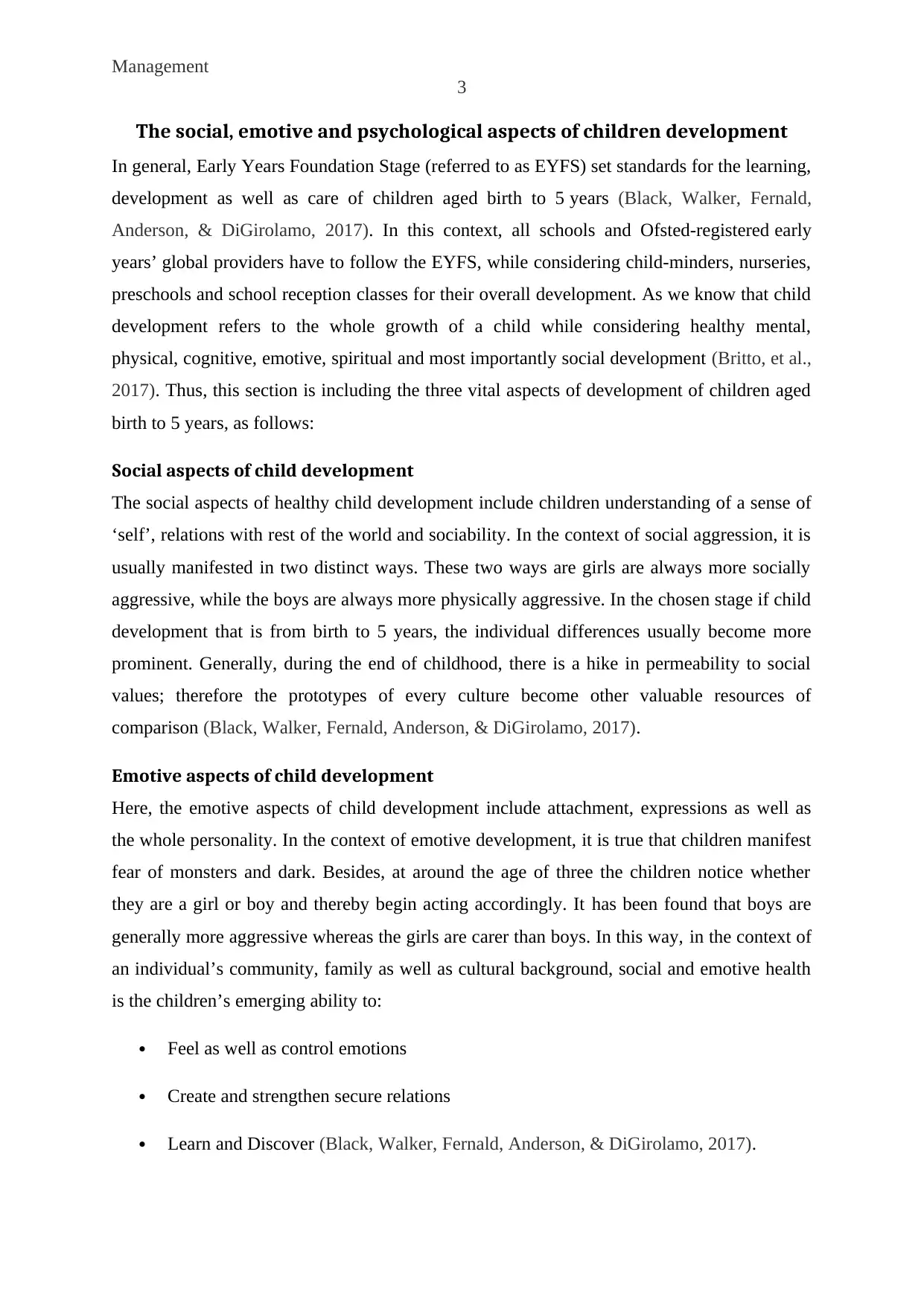
Management
3
The social, emotive and psychological aspects of children development
In general, Early Years Foundation Stage (referred to as EYFS) set standards for the learning,
development as well as care of children aged birth to 5 years (Black, Walker, Fernald,
Anderson, & DiGirolamo, 2017). In this context, all schools and Ofsted-registered early
years’ global providers have to follow the EYFS, while considering child-minders, nurseries,
preschools and school reception classes for their overall development. As we know that child
development refers to the whole growth of a child while considering healthy mental,
physical, cognitive, emotive, spiritual and most importantly social development (Britto, et al.,
2017). Thus, this section is including the three vital aspects of development of children aged
birth to 5 years, as follows:
Social aspects of child development
The social aspects of healthy child development include children understanding of a sense of
‘self’, relations with rest of the world and sociability. In the context of social aggression, it is
usually manifested in two distinct ways. These two ways are girls are always more socially
aggressive, while the boys are always more physically aggressive. In the chosen stage if child
development that is from birth to 5 years, the individual differences usually become more
prominent. Generally, during the end of childhood, there is a hike in permeability to social
values; therefore the prototypes of every culture become other valuable resources of
comparison (Black, Walker, Fernald, Anderson, & DiGirolamo, 2017).
Emotive aspects of child development
Here, the emotive aspects of child development include attachment, expressions as well as
the whole personality. In the context of emotive development, it is true that children manifest
fear of monsters and dark. Besides, at around the age of three the children notice whether
they are a girl or boy and thereby begin acting accordingly. It has been found that boys are
generally more aggressive whereas the girls are carer than boys. In this way, in the context of
an individual’s community, family as well as cultural background, social and emotive health
is the children’s emerging ability to:
Feel as well as control emotions
Create and strengthen secure relations
Learn and Discover (Black, Walker, Fernald, Anderson, & DiGirolamo, 2017).
3
The social, emotive and psychological aspects of children development
In general, Early Years Foundation Stage (referred to as EYFS) set standards for the learning,
development as well as care of children aged birth to 5 years (Black, Walker, Fernald,
Anderson, & DiGirolamo, 2017). In this context, all schools and Ofsted-registered early
years’ global providers have to follow the EYFS, while considering child-minders, nurseries,
preschools and school reception classes for their overall development. As we know that child
development refers to the whole growth of a child while considering healthy mental,
physical, cognitive, emotive, spiritual and most importantly social development (Britto, et al.,
2017). Thus, this section is including the three vital aspects of development of children aged
birth to 5 years, as follows:
Social aspects of child development
The social aspects of healthy child development include children understanding of a sense of
‘self’, relations with rest of the world and sociability. In the context of social aggression, it is
usually manifested in two distinct ways. These two ways are girls are always more socially
aggressive, while the boys are always more physically aggressive. In the chosen stage if child
development that is from birth to 5 years, the individual differences usually become more
prominent. Generally, during the end of childhood, there is a hike in permeability to social
values; therefore the prototypes of every culture become other valuable resources of
comparison (Black, Walker, Fernald, Anderson, & DiGirolamo, 2017).
Emotive aspects of child development
Here, the emotive aspects of child development include attachment, expressions as well as
the whole personality. In the context of emotive development, it is true that children manifest
fear of monsters and dark. Besides, at around the age of three the children notice whether
they are a girl or boy and thereby begin acting accordingly. It has been found that boys are
generally more aggressive whereas the girls are carer than boys. In this way, in the context of
an individual’s community, family as well as cultural background, social and emotive health
is the children’s emerging ability to:
Feel as well as control emotions
Create and strengthen secure relations
Learn and Discover (Black, Walker, Fernald, Anderson, & DiGirolamo, 2017).
Paraphrase This Document
Need a fresh take? Get an instant paraphrase of this document with our AI Paraphraser
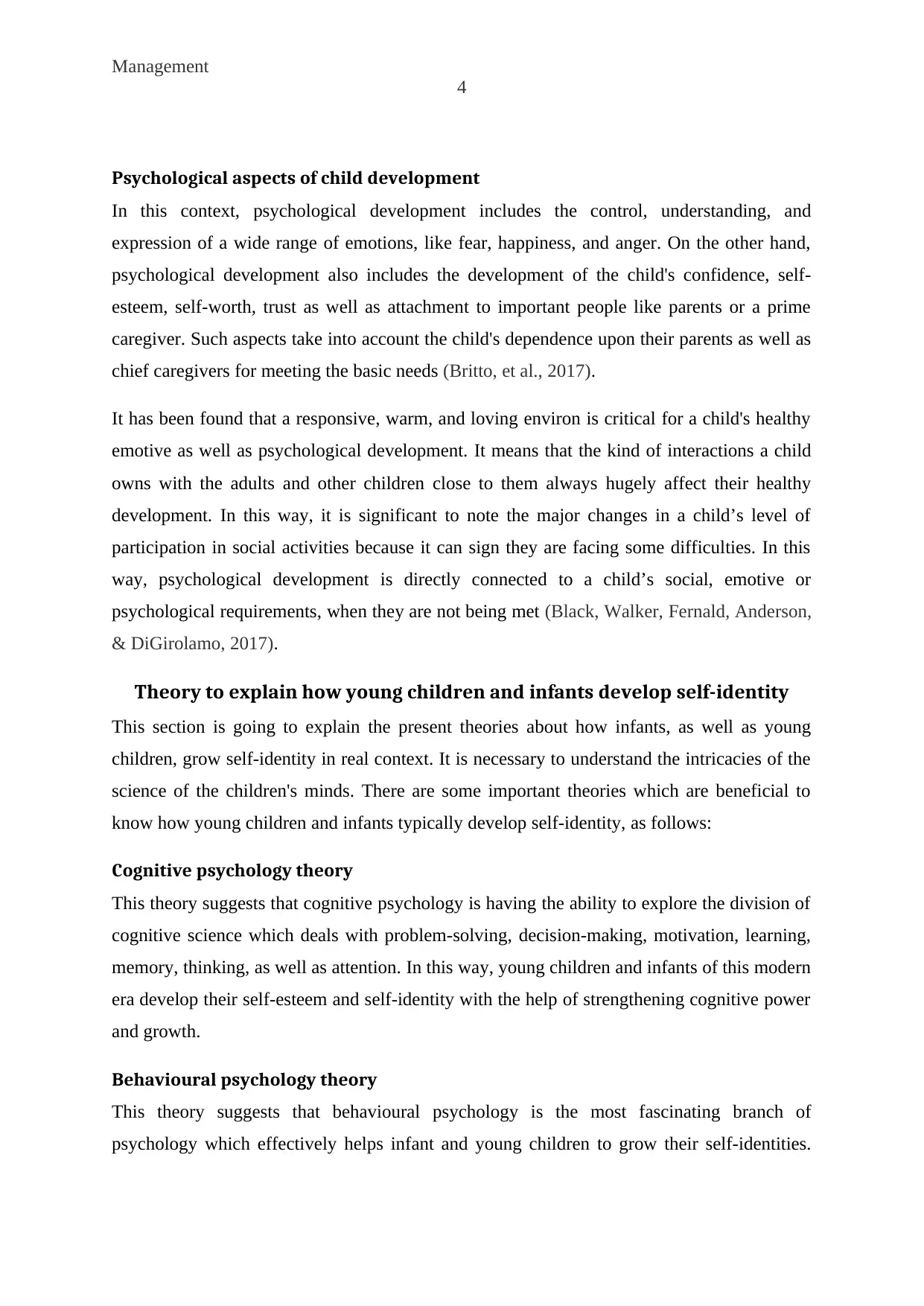
Management
4
Psychological aspects of child development
In this context, psychological development includes the control, understanding, and
expression of a wide range of emotions, like fear, happiness, and anger. On the other hand,
psychological development also includes the development of the child's confidence, self-
esteem, self-worth, trust as well as attachment to important people like parents or a prime
caregiver. Such aspects take into account the child's dependence upon their parents as well as
chief caregivers for meeting the basic needs (Britto, et al., 2017).
It has been found that a responsive, warm, and loving environ is critical for a child's healthy
emotive as well as psychological development. It means that the kind of interactions a child
owns with the adults and other children close to them always hugely affect their healthy
development. In this way, it is significant to note the major changes in a child’s level of
participation in social activities because it can sign they are facing some difficulties. In this
way, psychological development is directly connected to a child’s social, emotive or
psychological requirements, when they are not being met (Black, Walker, Fernald, Anderson,
& DiGirolamo, 2017).
Theory to explain how young children and infants develop self-identity
This section is going to explain the present theories about how infants, as well as young
children, grow self-identity in real context. It is necessary to understand the intricacies of the
science of the children's minds. There are some important theories which are beneficial to
know how young children and infants typically develop self-identity, as follows:
Cognitive psychology theory
This theory suggests that cognitive psychology is having the ability to explore the division of
cognitive science which deals with problem-solving, decision-making, motivation, learning,
memory, thinking, as well as attention. In this way, young children and infants of this modern
era develop their self-esteem and self-identity with the help of strengthening cognitive power
and growth.
Behavioural psychology theory
This theory suggests that behavioural psychology is the most fascinating branch of
psychology which effectively helps infant and young children to grow their self-identities.
4
Psychological aspects of child development
In this context, psychological development includes the control, understanding, and
expression of a wide range of emotions, like fear, happiness, and anger. On the other hand,
psychological development also includes the development of the child's confidence, self-
esteem, self-worth, trust as well as attachment to important people like parents or a prime
caregiver. Such aspects take into account the child's dependence upon their parents as well as
chief caregivers for meeting the basic needs (Britto, et al., 2017).
It has been found that a responsive, warm, and loving environ is critical for a child's healthy
emotive as well as psychological development. It means that the kind of interactions a child
owns with the adults and other children close to them always hugely affect their healthy
development. In this way, it is significant to note the major changes in a child’s level of
participation in social activities because it can sign they are facing some difficulties. In this
way, psychological development is directly connected to a child’s social, emotive or
psychological requirements, when they are not being met (Black, Walker, Fernald, Anderson,
& DiGirolamo, 2017).
Theory to explain how young children and infants develop self-identity
This section is going to explain the present theories about how infants, as well as young
children, grow self-identity in real context. It is necessary to understand the intricacies of the
science of the children's minds. There are some important theories which are beneficial to
know how young children and infants typically develop self-identity, as follows:
Cognitive psychology theory
This theory suggests that cognitive psychology is having the ability to explore the division of
cognitive science which deals with problem-solving, decision-making, motivation, learning,
memory, thinking, as well as attention. In this way, young children and infants of this modern
era develop their self-esteem and self-identity with the help of strengthening cognitive power
and growth.
Behavioural psychology theory
This theory suggests that behavioural psychology is the most fascinating branch of
psychology which effectively helps infant and young children to grow their self-identities.
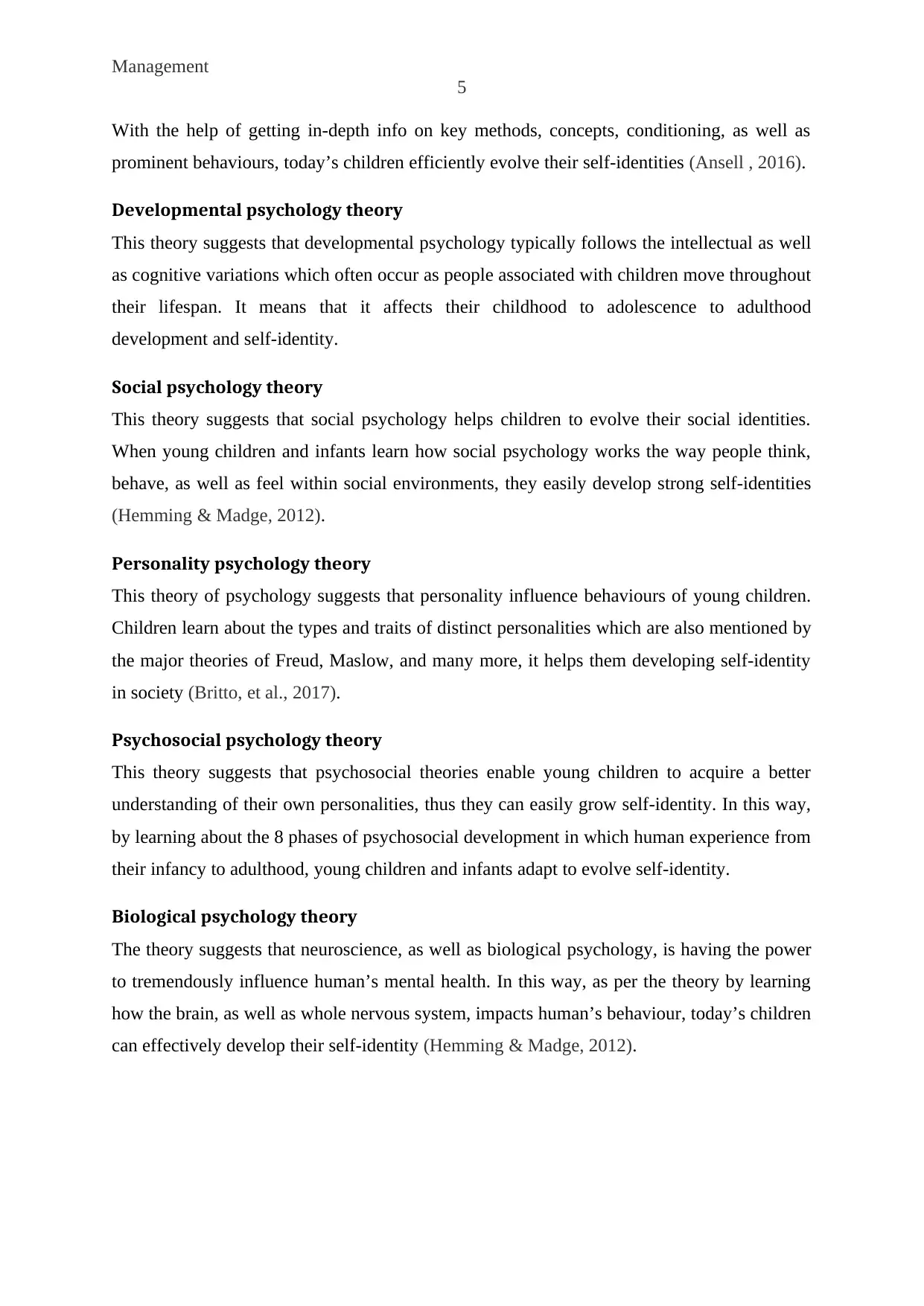
Management
5
With the help of getting in-depth info on key methods, concepts, conditioning, as well as
prominent behaviours, today’s children efficiently evolve their self-identities (Ansell , 2016).
Developmental psychology theory
This theory suggests that developmental psychology typically follows the intellectual as well
as cognitive variations which often occur as people associated with children move throughout
their lifespan. It means that it affects their childhood to adolescence to adulthood
development and self-identity.
Social psychology theory
This theory suggests that social psychology helps children to evolve their social identities.
When young children and infants learn how social psychology works the way people think,
behave, as well as feel within social environments, they easily develop strong self-identities
(Hemming & Madge, 2012).
Personality psychology theory
This theory of psychology suggests that personality influence behaviours of young children.
Children learn about the types and traits of distinct personalities which are also mentioned by
the major theories of Freud, Maslow, and many more, it helps them developing self-identity
in society (Britto, et al., 2017).
Psychosocial psychology theory
This theory suggests that psychosocial theories enable young children to acquire a better
understanding of their own personalities, thus they can easily grow self-identity. In this way,
by learning about the 8 phases of psychosocial development in which human experience from
their infancy to adulthood, young children and infants adapt to evolve self-identity.
Biological psychology theory
The theory suggests that neuroscience, as well as biological psychology, is having the power
to tremendously influence human’s mental health. In this way, as per the theory by learning
how the brain, as well as whole nervous system, impacts human’s behaviour, today’s children
can effectively develop their self-identity (Hemming & Madge, 2012).
5
With the help of getting in-depth info on key methods, concepts, conditioning, as well as
prominent behaviours, today’s children efficiently evolve their self-identities (Ansell , 2016).
Developmental psychology theory
This theory suggests that developmental psychology typically follows the intellectual as well
as cognitive variations which often occur as people associated with children move throughout
their lifespan. It means that it affects their childhood to adolescence to adulthood
development and self-identity.
Social psychology theory
This theory suggests that social psychology helps children to evolve their social identities.
When young children and infants learn how social psychology works the way people think,
behave, as well as feel within social environments, they easily develop strong self-identities
(Hemming & Madge, 2012).
Personality psychology theory
This theory of psychology suggests that personality influence behaviours of young children.
Children learn about the types and traits of distinct personalities which are also mentioned by
the major theories of Freud, Maslow, and many more, it helps them developing self-identity
in society (Britto, et al., 2017).
Psychosocial psychology theory
This theory suggests that psychosocial theories enable young children to acquire a better
understanding of their own personalities, thus they can easily grow self-identity. In this way,
by learning about the 8 phases of psychosocial development in which human experience from
their infancy to adulthood, young children and infants adapt to evolve self-identity.
Biological psychology theory
The theory suggests that neuroscience, as well as biological psychology, is having the power
to tremendously influence human’s mental health. In this way, as per the theory by learning
how the brain, as well as whole nervous system, impacts human’s behaviour, today’s children
can effectively develop their self-identity (Hemming & Madge, 2012).
⊘ This is a preview!⊘
Do you want full access?
Subscribe today to unlock all pages.

Trusted by 1+ million students worldwide
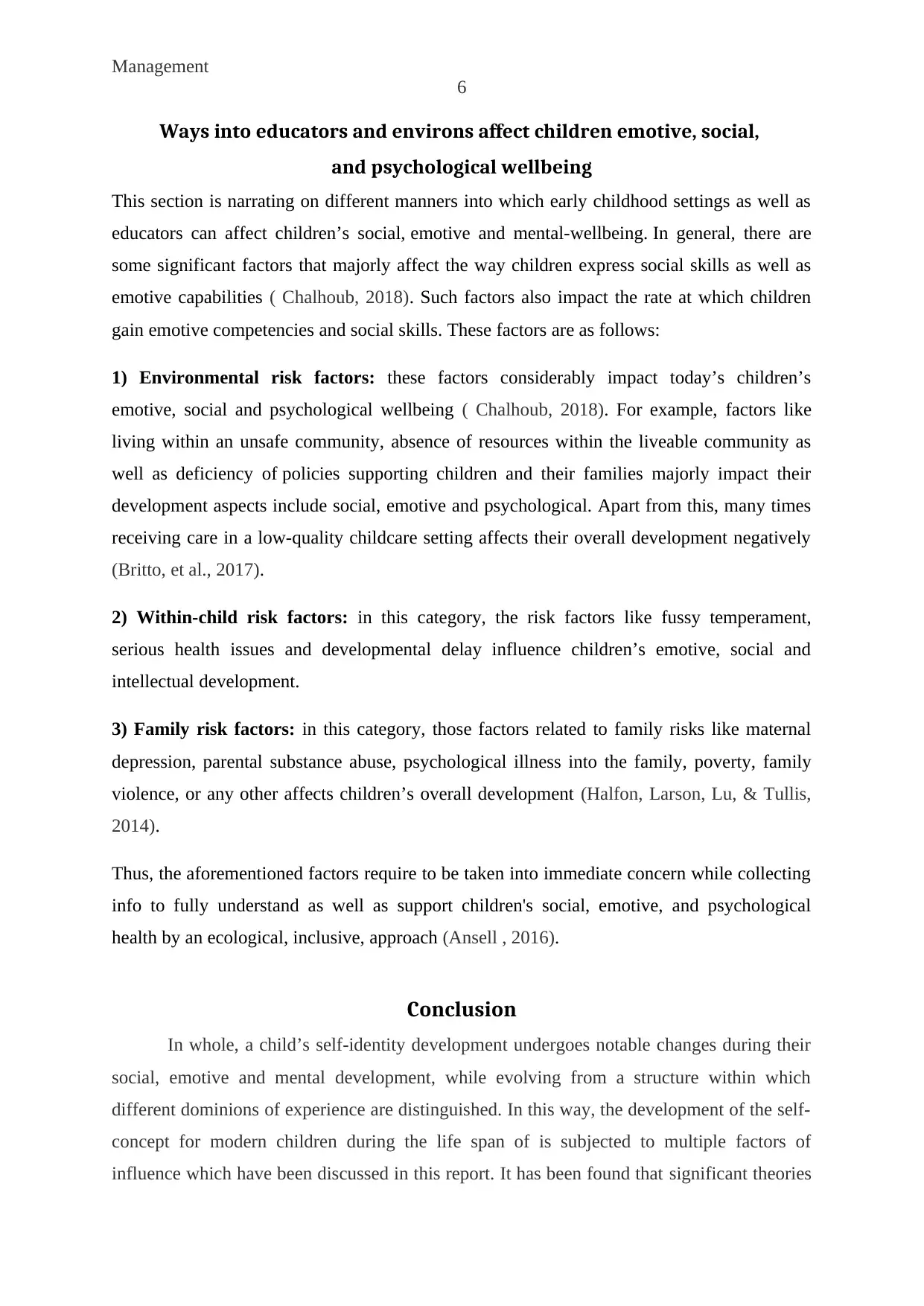
Management
6
Ways into educators and environs affect children emotive, social,
and psychological wellbeing
This section is narrating on different manners into which early childhood settings as well as
educators can affect children’s social, emotive and mental-wellbeing. In general, there are
some significant factors that majorly affect the way children express social skills as well as
emotive capabilities ( Chalhoub, 2018). Such factors also impact the rate at which children
gain emotive competencies and social skills. These factors are as follows:
1) Environmental risk factors: these factors considerably impact today’s children’s
emotive, social and psychological wellbeing ( Chalhoub, 2018). For example, factors like
living within an unsafe community, absence of resources within the liveable community as
well as deficiency of policies supporting children and their families majorly impact their
development aspects include social, emotive and psychological. Apart from this, many times
receiving care in a low-quality childcare setting affects their overall development negatively
(Britto, et al., 2017).
2) Within-child risk factors: in this category, the risk factors like fussy temperament,
serious health issues and developmental delay influence children’s emotive, social and
intellectual development.
3) Family risk factors: in this category, those factors related to family risks like maternal
depression, parental substance abuse, psychological illness into the family, poverty, family
violence, or any other affects children’s overall development (Halfon, Larson, Lu, & Tullis,
2014).
Thus, the aforementioned factors require to be taken into immediate concern while collecting
info to fully understand as well as support children's social, emotive, and psychological
health by an ecological, inclusive, approach (Ansell , 2016).
Conclusion
In whole, a child’s self-identity development undergoes notable changes during their
social, emotive and mental development, while evolving from a structure within which
different dominions of experience are distinguished. In this way, the development of the self-
concept for modern children during the life span of is subjected to multiple factors of
influence which have been discussed in this report. It has been found that significant theories
6
Ways into educators and environs affect children emotive, social,
and psychological wellbeing
This section is narrating on different manners into which early childhood settings as well as
educators can affect children’s social, emotive and mental-wellbeing. In general, there are
some significant factors that majorly affect the way children express social skills as well as
emotive capabilities ( Chalhoub, 2018). Such factors also impact the rate at which children
gain emotive competencies and social skills. These factors are as follows:
1) Environmental risk factors: these factors considerably impact today’s children’s
emotive, social and psychological wellbeing ( Chalhoub, 2018). For example, factors like
living within an unsafe community, absence of resources within the liveable community as
well as deficiency of policies supporting children and their families majorly impact their
development aspects include social, emotive and psychological. Apart from this, many times
receiving care in a low-quality childcare setting affects their overall development negatively
(Britto, et al., 2017).
2) Within-child risk factors: in this category, the risk factors like fussy temperament,
serious health issues and developmental delay influence children’s emotive, social and
intellectual development.
3) Family risk factors: in this category, those factors related to family risks like maternal
depression, parental substance abuse, psychological illness into the family, poverty, family
violence, or any other affects children’s overall development (Halfon, Larson, Lu, & Tullis,
2014).
Thus, the aforementioned factors require to be taken into immediate concern while collecting
info to fully understand as well as support children's social, emotive, and psychological
health by an ecological, inclusive, approach (Ansell , 2016).
Conclusion
In whole, a child’s self-identity development undergoes notable changes during their
social, emotive and mental development, while evolving from a structure within which
different dominions of experience are distinguished. In this way, the development of the self-
concept for modern children during the life span of is subjected to multiple factors of
influence which have been discussed in this report. It has been found that significant theories
Paraphrase This Document
Need a fresh take? Get an instant paraphrase of this document with our AI Paraphraser
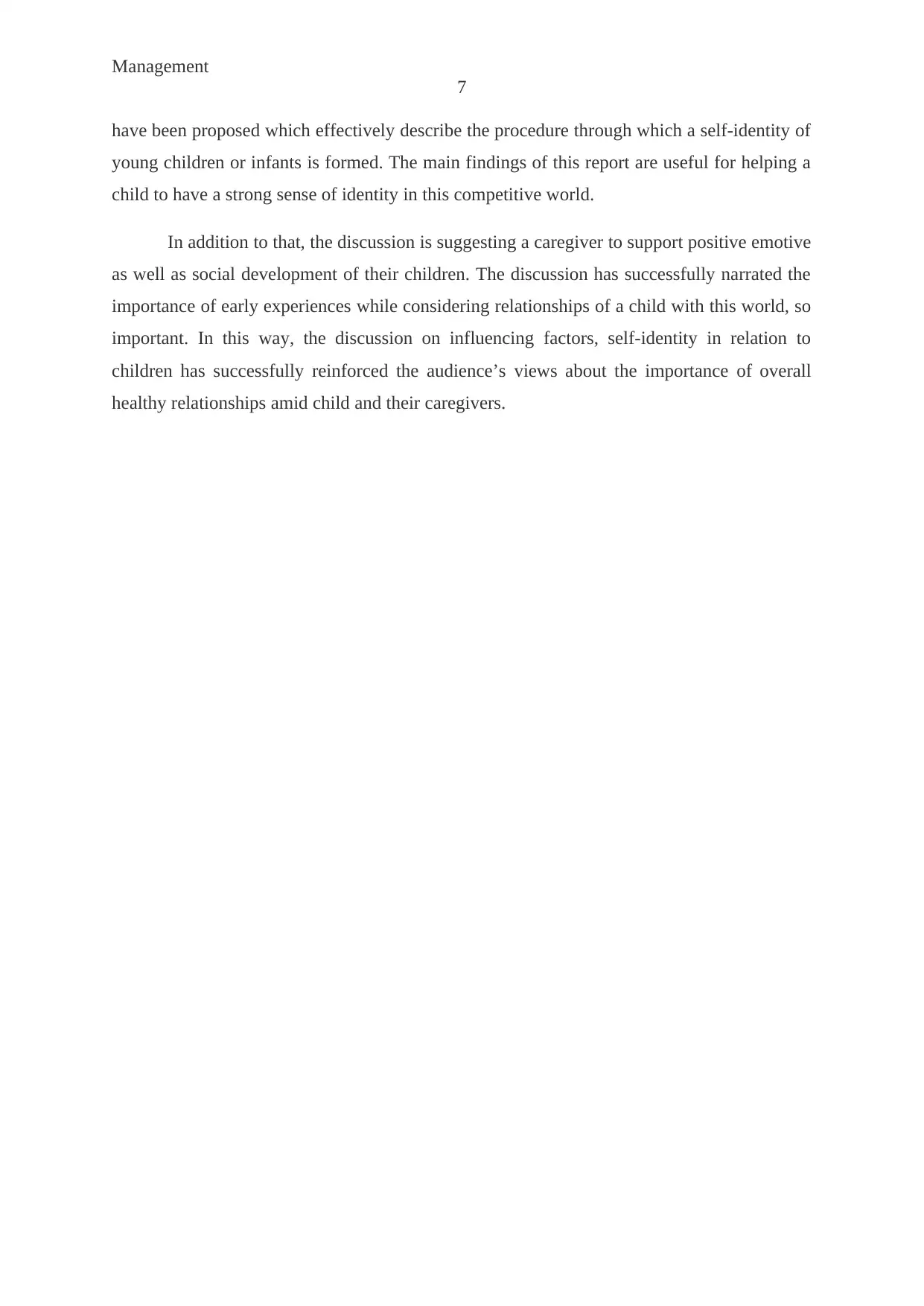
Management
7
have been proposed which effectively describe the procedure through which a self-identity of
young children or infants is formed. The main findings of this report are useful for helping a
child to have a strong sense of identity in this competitive world.
In addition to that, the discussion is suggesting a caregiver to support positive emotive
as well as social development of their children. The discussion has successfully narrated the
importance of early experiences while considering relationships of a child with this world, so
important. In this way, the discussion on influencing factors, self-identity in relation to
children has successfully reinforced the audience’s views about the importance of overall
healthy relationships amid child and their caregivers.
7
have been proposed which effectively describe the procedure through which a self-identity of
young children or infants is formed. The main findings of this report are useful for helping a
child to have a strong sense of identity in this competitive world.
In addition to that, the discussion is suggesting a caregiver to support positive emotive
as well as social development of their children. The discussion has successfully narrated the
importance of early experiences while considering relationships of a child with this world, so
important. In this way, the discussion on influencing factors, self-identity in relation to
children has successfully reinforced the audience’s views about the importance of overall
healthy relationships amid child and their caregivers.
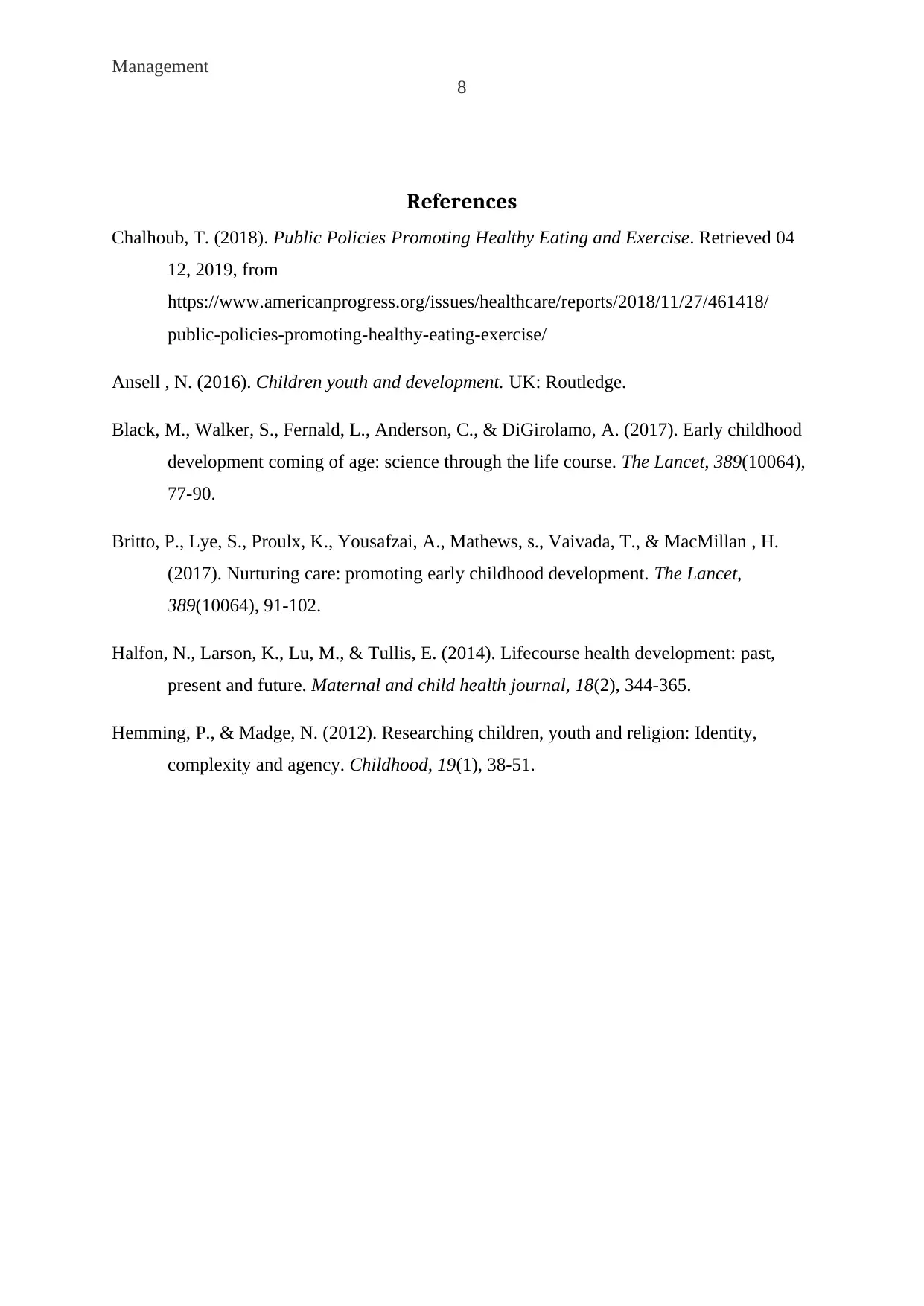
Management
8
References
Chalhoub, T. (2018). Public Policies Promoting Healthy Eating and Exercise. Retrieved 04
12, 2019, from
https://www.americanprogress.org/issues/healthcare/reports/2018/11/27/461418/
public-policies-promoting-healthy-eating-exercise/
Ansell , N. (2016). Children youth and development. UK: Routledge.
Black, M., Walker, S., Fernald, L., Anderson, C., & DiGirolamo, A. (2017). Early childhood
development coming of age: science through the life course. The Lancet, 389(10064),
77-90.
Britto, P., Lye, S., Proulx, K., Yousafzai, A., Mathews, s., Vaivada, T., & MacMillan , H.
(2017). Nurturing care: promoting early childhood development. The Lancet,
389(10064), 91-102.
Halfon, N., Larson, K., Lu, M., & Tullis, E. (2014). Lifecourse health development: past,
present and future. Maternal and child health journal, 18(2), 344-365.
Hemming, P., & Madge, N. (2012). Researching children, youth and religion: Identity,
complexity and agency. Childhood, 19(1), 38-51.
8
References
Chalhoub, T. (2018). Public Policies Promoting Healthy Eating and Exercise. Retrieved 04
12, 2019, from
https://www.americanprogress.org/issues/healthcare/reports/2018/11/27/461418/
public-policies-promoting-healthy-eating-exercise/
Ansell , N. (2016). Children youth and development. UK: Routledge.
Black, M., Walker, S., Fernald, L., Anderson, C., & DiGirolamo, A. (2017). Early childhood
development coming of age: science through the life course. The Lancet, 389(10064),
77-90.
Britto, P., Lye, S., Proulx, K., Yousafzai, A., Mathews, s., Vaivada, T., & MacMillan , H.
(2017). Nurturing care: promoting early childhood development. The Lancet,
389(10064), 91-102.
Halfon, N., Larson, K., Lu, M., & Tullis, E. (2014). Lifecourse health development: past,
present and future. Maternal and child health journal, 18(2), 344-365.
Hemming, P., & Madge, N. (2012). Researching children, youth and religion: Identity,
complexity and agency. Childhood, 19(1), 38-51.
⊘ This is a preview!⊘
Do you want full access?
Subscribe today to unlock all pages.

Trusted by 1+ million students worldwide
1 out of 9
Related Documents
Your All-in-One AI-Powered Toolkit for Academic Success.
+13062052269
info@desklib.com
Available 24*7 on WhatsApp / Email
![[object Object]](/_next/static/media/star-bottom.7253800d.svg)
Unlock your academic potential
Copyright © 2020–2026 A2Z Services. All Rights Reserved. Developed and managed by ZUCOL.





